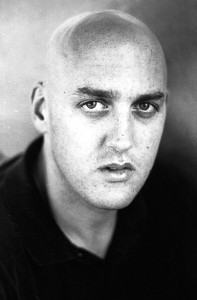Every once in a while a novel comes along that leaves readers gasping at the skill of an author’s use of language. Ben Marcus’ startling experimental fiction, “The Flame Alphabet,” fits this bill.
In his world, the planet is tainted by words. Language has become a toxin, spewing forth first from the mouths of Jewish children. Only those who are fully matured are susceptible to the eroding effects of words, leaving parents pleading for their children’s speech to cease killing them. The toxic effect soon spreads from the mouths of Jewish children to the mouths of all children, then all adults, all written word and eventually, all symbols as well. Anything conveying meaning is corrosive on adults’ bodies.

Marcus, a professor at Columbia University and an Ithaca College Distinguished Writer for the month of April, shows the reader this horrific world through the lens of a family unit. Marcus deviates from his jumping narrative style of other works such as “Notable American Women” by providing a single narrator in the father of this family, Sam. His narration is terrifying and empty as he relates the world around him, yet full of sensory descriptions that leave the reader understanding Sam down to his very being.
Sam is crass, stubborn, and it seems as though every effort he undergoes to save his family is futile. It’s the ultimate catch-22: Sam wants himself and his wife Claire to provide their difficult 14-year-old daughter, Esther, with all the health and tenderness parents should be able to provide their child, even as she kills them with her very presence.
The quandary Sam and Claire face is the same as all the other parents in the book: Do we send our children off in government-issued red buses to an unknown place for our own safety, do we run away from them under cover of darkness, or do we die because we can’t bear to be separated from them?
Marcus introduces a fabricated religion to “The Flame Alphabet” that he refers to as “forest Judaism.” Those who practice forest Judaism have a secluded hut in the woods with a hole in the ground that, if they tap into the right frequency with their mysterious equipment, will produce sermons from Rabbis about what they should do during the epidemic. Embedded in forest Judaism is the need for silence and secrecy concerning their religion, a quietude that a mysterious red-haired man named Murphy would like to break and exploit. This man is the ultimate manipulator in a world where nothing is sure. Marcus knows his characters so well that Murphy is perfectly able to exploit their flaws in pursuit of secrets he believes will gain him a foothold in an epidemical world.
Marcus is preceded in his writing by single-narrative, apocalyptic pieces about
family and survival such as Cormac McCarthy’s “The Road,” which undoubtedly influenced his writing style. Disregarding the quasi-unoriginality of the narrative, Marcus introduces a new stylistic element that is bound to strike readers profoundly: historic fact.
Marcus cites examples from Roman author Pliny, who denounced children’s speech as a source of pestilence and banned youth from his presence, Thoreau, who called an alphabet the saddest song, and the warnings of Plutarch, Cicero and Ovid not to read their works if one valued their life. These references paint a picture of a world that should have anticipated the lethal nature of language.
The novel doesn’t provide a happy ending or much finality at all, and there’s no use looking for it. Marcus’ astute read offers something more than a story; it provides a gripping account of the power of language, the urge for solidarity and the relentlessness of the pursuit of family.




